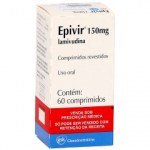- Type of Drug: Antiviral.
- Prescribed for: HIV infection.
Lamivudine General Information
Lamivudine is a nucleoside-type antiviral that works on HIV in the same way as Zalcitabine (ddC), Zidovudine, Stavudine, and other drugs of this type. It is only given in combination with Zidovudine for people who do not respond to that drug alone. Lamivudine is rapidly absorbed into the blood, and most of it passes out of the body in urine.
Cautions and Warnings
Do not take this medicine if you are sensitive or allergic to Lamivudine. People with kidney disease need less Lamivudine than those with normal kidneys.
Lamivudine Possible Side Effects
Since Lamivudine is taken with Zidovudine, the listed side effects are those of the drug combination. The long-term effects of Lamivudine are not known.
- Most common: headache, feelings of ill health, fever, chills, skin rash, nausea, vomiting, diarrhea, loss of appetite, abdominal pain or cramps, nervous-system problems (tingling, poor coordination), sleeplessness, dizziness, depression, stuffy or runny nose, cough, and muscle pain.
- Common: upset stomach, joint pains, and tingling in the hands or feet (in children). Lamivudine can also affect a variety of blood tests.
- Rare: pancreas irritation (children taking Lamivudine develop this side effect much more often than adults).
Lamivudine Drug Interactions
- Lamivudine increases maximum blood levels of Zidovudine by 39 percent. This is helpful in fighting HIV.
- Trimethoprim/Sulfamethoxazole (taken for opportunistic infections of AIDS) increases the amount of Lamivudine in the blood.
Food Interactions
Lamivudine is absorbed more slowly when taken with food, but not enough to affect the total amount of drug in the blood.
Lamivudine Usual Dose
Adult and adolescent (age 12 and older): 150 mg twice a day in combination with Zidovudine. Adults weighing less than 110 pounds should receive about 1 mg per pound twice a day. Dosage is reduced as kidney function decreases.
Child (3 months to 11 years): about 2 mg per pound twice a day, no more than 150 mg per dose.
Overdosage
There has been only one reported case of Lamivudine overdose; no side effects were noted. Call your local poison center for more information.
Lamivudine Special Information
Lamivudine, like other HIV medicines, does not cure AIDS. People taking this medicine will still develop opportunistic infections and other complications of AIDS. This drug does not reduce the risk of transmitting HIV to others.
It is very important to take this drug exactly as prescribed. If you forget a dose, take it as soon as you remember. If it is almost time for your next dose, skip the forgotten dose and continue with your regular schedule. Call your doctor if you forget 2 or more doses in a row.
Call your doctor at once if your child develops signs of pancreas inflammation while taking Lamivudine, including very severe abdominal pain, tense abdominal muscles, sweating, feeling very ill, shallow and rapid breathing, fever, and possible fainting.
Lamivudine Special Populations
Pregnancy/Breast-feeding
Lamivudine passes into the blood circulation of the developing fetus. Some animal studies of the drug indicated that it may be dangerous to the developing fetus, but others showed no effect. There is no information about the effects of Lamivudine in pregnant women, but it should only be taken during pregnancy if absolutely necessary. The manufacturer has organized a registry to help track what happens to pregnant women who take this medicine. It is not known if Lamivudine passes into breast milk. Nursing mothers who must take this medicine should bottle-feed their babies.
Seniors
Older adults may require less Lamivudine, according to their kidney function. Otherwise, this medicine may be taken by seniors without special restriction.

